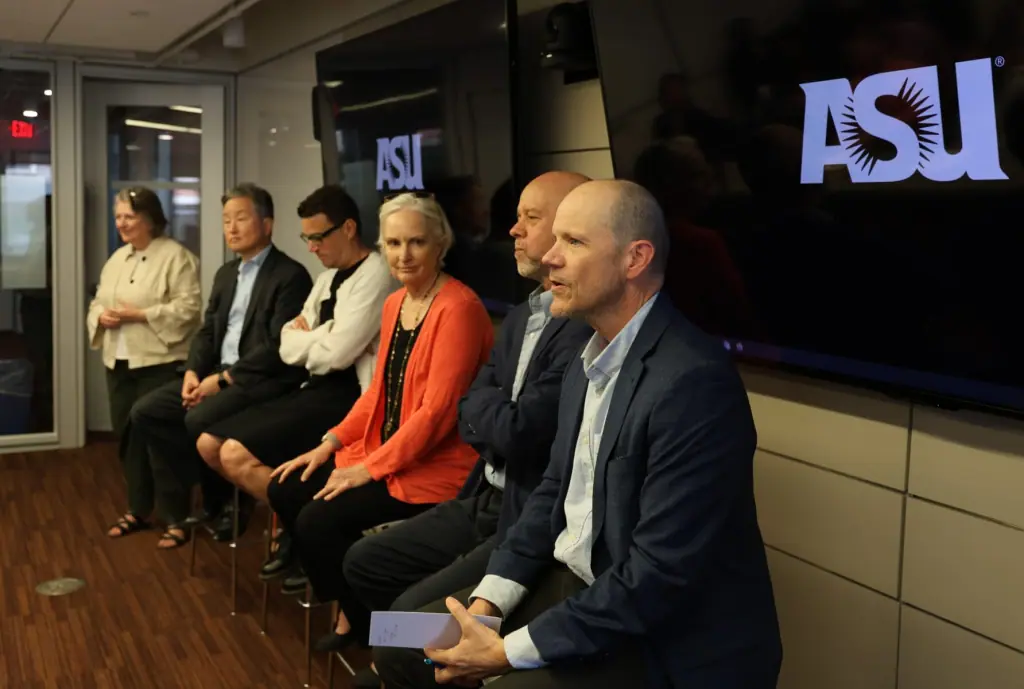By Jessica Greensides, ASU sustainable food systems graduate student

On May 2nd, 2024, my Sustainable Food Systems graduate cohort had the unique opportunity to talk with five influential professionals who started their careers in food policy and now work outside policy in different NGOs to help influence and change food systems. Starting on the right of the photo, we have Doug O’Brien, Ferd Hoefner, Ann Mills, Michael Fernandez, and Brian Ronholm.
Doug O’Brien, CEO and President of the National Cooperative Business Association, returned to speak with my cohort to explain that the two keys to success are developing “credibility and relationships.” O’Brien stated that “we’re all in this fight together,” and after working on one or two farm bills, you discover it’s essential to just “be a nice person and return phone calls.” Policy is often viewed as people arguing and debating to get the best deal or bill passed for their side. O’Brien highlighted that this is not the case; being someone you can talk to and work with is the only true way to make an impact and enjoy what you do, whether in policy or as the head of an NGO.
Ferd Hoefner, a Washington, D.C.-based consultant working on behalf of multiple organizations with interests in federal farm, food, and environmental policy, provided feedback on the two farm bills. He discussed the need to always have a bipartisan viewpoint; otherwise, policy will never move forward. He offered a very experienced and realistic outlook on how policy, NGOs, and even the private sector work, highlighting the need to always “align with the grassroots of your coalition.” As students new to the world of policy, understanding and working with other viewpoints to reach the same goal is crucial. Hoefner left us with many nuggets of advice, but what really stood out was the importance of aligning your goals with the bigger picture and recognizing that no battle is worth fighting unless it supports the collective objective.
Ann Mills, Executive Director of the Agua Fund, highlighted the importance of “using your own powers.” She explained how donors and money can truly change policy, but actions such as showing up and presenting a united front with collected ideas and concerns can also move policy forward. Mills highlighted many ways to influence policy, including how Ferd Hoefner mentioned, “advocacy doesn’t stop,” and delved further into his statement by explaining how constant funding is critical. Working to get new and diverse groups on committees who are willing and looking to “play the long game” and “challenge the status quo” is essential. Mills inspired my class, showing how working together in any position can move the needle forward on policymaking. It just takes time, money, and an understanding that you can make an impact.
Michael Fernandez, funding director of AAAS Center for Scientific Evidence in Public Issues, works to “bring people together” by connecting experts with scientific understanding and policymakers at the local and state levels. Fernandez shared a recent success story, explaining how PFAS (per- and polyfluoroalkyl substances) are everywhere. AAAS provided information to local agencies to show the presence of PFAS in our water and food supply, which these agencies then used to begin making policy decisions. As more understanding is raised about these issues and their ubiquity, policy can then be made. It’s about creating an understanding of the issue through scientific data. This story left everyone in awe of how closing the gap between policymakers and experts is the only way to have impactful policy backed by data.
Brian Ronholm, Director of Food Policy at Consumer Reports, discussed his role in moving policy through spreading awareness. “Consumer purchasing can help move decisions,” and the reports and knowledge they gather on items can help provide the average citizen, who doesn’t have time to read every label at the grocery store, with a way to make an educated choice when purchasing. Brian Ronholm further discussed the impact that stakeholders can have on policymakers when they work together to create coalitions and hold policymakers accountable. Resulting in changes that have an impact, such as the FDA’s first deputy commissioner for human foods, as of September 2023. Information and proper understanding for anyone is the only way to move forward.
All five of these professionals helped highlight how policy can move forward in many different ways. It is up to us, the incoming food systems professionals, to find our way and understand that we can make an impact in many roles and positions, be it political or from the outside in. The final note each left us with was about work-life balance and how to handle having a personal and professional life. Each panelist provided their advice with one general underlying message: the cliché is true—if you love what you do, it’s not work, and the sacrifices will balance out. The key is to “find your compromises” and remember to find your own path, prioritizing what you want to accomplish both professionally AND personally.
This blog is part of a series from the Swette Center’s annual Food Policy Immersion, a required course in their two graduate programs. Students met with federal food and agriculture focused officials at USDA, the White House, and Congress alongside many other important influencers of policy in industry and non-profits.